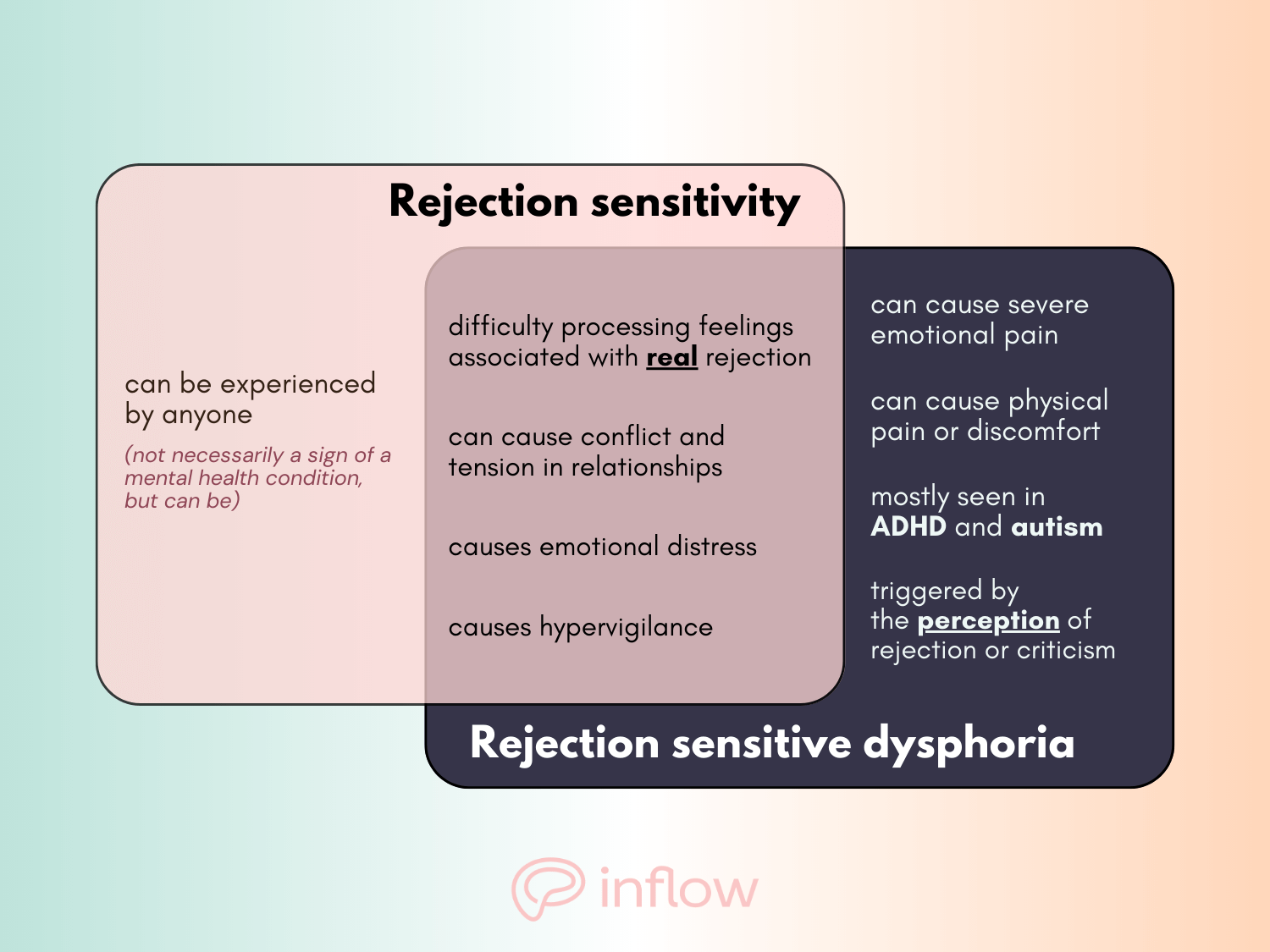Are you frequently overwhelmed by emotions at work but can't understand why? Maybe you started crying when your pitch was rejected, or perhaps you felt intense anger when you received an email from a colleague.
While it's perfectly normal to experience a range of feelings in the workplace, if your emotions are consistently intense and usually triggered by minor incidents, it could indicate an underlying issue that needs attention.
This article explores workplace emotions, covering the range of "normal" emotional experiences adults may encounter on the job, examples of atypical emotional responses, and underlying mental health conditions that may contribute to intense or dysregulated emotions.
If you've ever wondered why you react the way you do at work (whether you're in a physical office or you work from home,) you're not alone.
Read on to learn what your emotions might be trying to tell you.
Too long; didn’t read
- It’s normal to be emotional at work. It becomes a concern when the emotions are frequently intense and hard to control.
- Causes of intense emotions include emotional dysregulation, certain mental health conditions, and rejection sensitivity.
- Some of the mental health conditions associated with strong emotional reactions include PTSD, autism, ADHD, anxiety, and depression.
- Overreacting to criticism is one of the main signs of rejection sensitive dysphoria in people with autism or ADHD.
- Certain coping strategies and therapy techniques can help you regain control over your emotions.
Emotions in the workplace

Work can be an emotionally charged environment for anybody. While some emotions may be positive and energizing—like the excitement and anticipation of a new project—others may be more negative and difficult to manage.
The most common negative emotions experienced by professionals around the globe include frustration, stress, and anxiety.1 In addition to these, there are plenty of other negative emotions you may be familiar with at work.
"Normal" negative workplace emotions:
- Stress
- Anxiety
- Boredom
- Frustration
- Dissatisfaction
- Disappointment
- Anger and irritation
- Insecurity and low confidence
- Overwhelm (deadline anxiety, anyone?)
- Annoyance (You know those emails that start with, "per my last email..."? Enough said.)
Tackle the underlying cause of your emotional outbursts. The Inflow app has learning modules to help you through big ADHD-related emotions, a community to encourage you, and coaches to guide you through it all. Get started with Inflow today!
Recognizing excessive emotional reactions
Emotions are a normal part of being human, and it's OK to experience and express them at work. You don't have to be robotic to maintain professionalism.
However, it's important to strike a balance between expressing your feelings and ensuring they don't negatively impact your professional life.
Signs that your emotions might be out of control at work
- Your emotions significantly reduce your productivity.
- It's hard for you to calm down when certain feelings are triggered.
- Your emotions can be pretty intense. (You might have even caught yourself off guard before with how strong they can be.)
- You've had angry outbursts or crying spells on the job.
- Receiving constructive criticism can sometimes feel like a personal attack, triggering anger or sadness
- When it comes to your coworkers, you have a low tolerance for frustration, stress, or irritation.
- You've made rash, impulsive decisions while under stress from work.
- Once you feel a certain way, your mind fixates on the emotion, and you can’t focus on anything else.
Examples of appropriate (and inappropriate) emotional responses in the office

Example 1: Your coworker didn’t handle a joint project as you’d hoped.
✨ Healthy response: Feeling a bit frustrated or annoyed
🚫 Excessive response: Getting so mad that you have an angry outburst the next time someone breathes in your direction
Example 2: Your boss gives you constructive feedback on your presentation.
✨ Healthy response: Feeling disappointed or upset but understanding that your boss had good intentions
🚫 Excessive response: Crying and shutting down because you now assume that your boss hates you based on that one piece of feedback
What's causing my intense emotional reactions at work?
1. Emotional dysregulation
Emotional dysregulation (ED) occurs when you have problems processing and controlling your emotions. It involves two key aspects:
- Emotional sensitivity: How intensely you experience emotions
- Emotional reactivity: How you respond to emotional events
Unfortunately, people with emotional dysregulation face heightened levels of both, which can lead to inappropriate and exaggerated reactions and behaviors.
Where does emotional dysregulation (ED) come from?
Differences in the brain, such as chemical imbalances and structural variations, are believed to be the culprits behind dysregulated emotions. These differences can stem from genetics, traumatic experiences, and certain mental health conditions.2
🗒️ Important note! ED is a symptom, not a diagnosis. And while it doesn't always signify something more, it is common in some mental health conditions.
Mental health conditions associated with emotional dysregulation:
- Anxiety disorders
- Attention-deficit/hyperactivity disorder (ADHD or ADD)
- Autism
- Bipolar disorder
- Borderline personality disorder (BPD)
- Depression
- Disruptive mood dysregulation disorder (DMDD)
- Dissociative identity disorder (DID)
- Eating disorders
- Obsessive-compulsive disorder (OCD)
- Post-traumatic stress disorder (PTSD and CPTSD)
- Schizophrenia
2. Rejection sensitivity
We all hate being left out or feeling rejected. That's another one of those "normal human” things. But for some, it's deeper than that.
Those with high rejection sensitivity (RS) are hypervigilant—always looking for any hint of rejection, judgment, or disapproval. They perceive rejection more readily and may even condition themselves to expect it from new people they meet.3
3. Rejection sensitive dysphoria (RSD)
Rejection sensitive dysphoria (RSD) is a more intense version of rejection sensitivity. It's when you have an overwhelming emotional reaction to judgment, rejection, disagreement, or criticism—whether it's real or just in your head.
👀 Are you experiencing RSD? Read the 7 signs here.

Can undiagnosed ADHD cause emotional sensitivity?
Yes, there's a strong correlation between ADHD and intense emotions. Up to 70% of ADHD adults struggle with emotional dysregulation.4
It's not just inattention and hyperactivity—ADHD is more complex than that. But, because of the misconceptions about ADHD, many people are well into adulthood before they're diagnosed. So, if you're an adult with undiagnosed ADHD, you might face emotional challenges without knowing why.
🚫 Read more common ADHD myths—and why they're wrong—here!
ADHD and emotions
While it isn't an official diagnostic criterion, research suggests that emotional dysregulation is a core feature of ADHD.5,6
It's even a hot topic among experts: Some consider it a comorbidity, and others think it should be listed as a fourth diagnostic symptom alongside inattention, hyperactivity, and impulsivity. Either way, they agree that emotional dysregulation is an ADHD thing.
Of course, ED is also present in conditions like anxiety and depression, but studies show a higher occurrence in ADHDers and autistics.
Neurologically, this makes sense.
The emotional ADHD brain
The ADHD brain has a smaller amygdala—the part of the brain that helps us process and regulate our emotions.2,7 And here's the kicker: ADHDers face more rejection and criticism in childhood than their peers.8
So, when you combine early rejection with emotional regulation difficulties, it's not surprising to see the link between ADHD and rejection sensitive dysphoria.
What do intense emotions look like for ADHDers in the workplace?
For adults and professionals with ADHD, emotional dysregulation and RSD can manifest in various ways:
- Getting easily irritated or annoyed at others
- Not wanting to ask for help or clarification at work because you’re afraid you’ll be judged for not already knowing what to do 9
- Overreacting to light criticism and obsessing over it for hours or days after the fact
- Dreading upcoming performance reviews because you're convinced you'll only receive negative feedback
- Procrastinating due to insecurity and low self-esteem (”Nothing I make will be good enough, anyway”)
- Feeling anxious when expressing your needs to others because you think you’re a burden
Supportive employers and accommodations
Developing coping skills on your own is crucial, but it's equally important to have a supportive work environment.
How employers can create a more inclusive workplace:
- Clear and regular communication
- Recognize sensitivity as a strength, not a weakness
- Be mindful of sensory issues, like bright lights or loud noises
- Empathy and compassion
- Implement wellness programs and mental health policies
- Allow for reasonable accommodations
Well, that last one is actually required by law, thanks to the Americans with Disabilities Act (ADA). If you're comfortable disclosing your ADHD diagnosis, some accommodations might include a private workspace or flexible scheduling.
How to manage emotional sensitivity in the workplace
Emotional dysregulation and RSD can negatively impact job performance and professional relationships.9 Luckily, there are ways to manage them.

DIY coping strategies for emotional regulation
Mindfulness practices
- Meditation
- Journaling
- Yoga
- The F.O.U.L. method
- The R.A.I.N. method
Self-care
- Take regular breaks throughout the day
- Spend more time outside
- Eat nutritious meals and snacks
- Get enough sleep
- Set boundaries and learn to say no
- Exercise regularly
Professional help options
If you need it, don't hesitate to seek professional help. Working with a mental health expert can help you identify triggers and develop effective strategies for managing your emotions.
You don't have to go on this journey alone.
Get a diagnosis
Even though it may seem daunting, getting a formal diagnosis can bring validation and relief. It sets the stage for effectively managing your symptoms. Regardless of your diagnosis, it'll be nice to finally have answers, won't it?
🩺 If you suspect ADHD, you can learn how to find the right doctor for a diagnosis here.
Cognitive behavioral therapy (CBT)
CBT techniques tackle negative thoughts head-on and equip you with tools to regain control of your emotions.
💡 Pro tip! If you're diagnosed with ADHD, look for a CBT therapist with ADHD-specific experience or training.
Medication
There are no approved medications for treating ED or RSD, but if it comes from an underlying condition like ADHD, treatment is available. Research has found that stimulant medications, like Concerta, and non-stimulant ADHD drugs, like Strattera, can improve emotional dysregulation.5
Final thoughts
Emotional sensitivity in the workplace may seem like a huge hurdle, but remember, you're definitely not the first person to experience big emotions at work, and you won’t be the last. And by now you know that experiencing intense emotions at work is actually really common among folks with ADHD, autism, anxiety, PTSD—just to name a few groups.
There are ways to cope; there are people who will listen to you; and there are resources to learn from.
But the most important thing is to show yourself some grace and kindness. You're only human.
-
Sources
1 Gallup | State of the Global Workplace 2023 Report: The Voice of the World's Employees (2023)
2 Frontiers in Psychiatry | Emotional Dysregulation in Children and Adolescents With Psychiatric Disorders. A Narrative Review (2021)
3 Personality and Individual Differences | Hypervigilance to Rejecting Stimuli in Rejection Sensitive Individuals: Behavioral and Neurocognitive Evidence (2015)
4 Neuroscience and BioBehavioral Reviews | Pharmacotherapy of emotional dysregulation in adults with ADHD: A systematic review and meta-analysis (2018)
5 PLOS ONE | Evidence of emotion dysregulation as a core symptom of adult ADHD: A systematic review (2023)
6 Journal of Child Psychology and Psychiatry | Evaluating chronic emotional dysregulation and irritability in relation to ADHD and depression genetic risk in children with ADHD (2020)
7 Journal of Attention Disorders | Amygdala Abnormalities in Adults With ADHD (2016)
8 Emotional and Behavioural Difficulties | ADHD symptoms and the teacher–student relationship: a systematic literature review (2019)
9 Pakistan Journal of Commerce and Social Sciences | Rejection Sensitivity and Job Performance: Workplace Loneliness as Mediator and Emotional Culture of Companionate Love as Moderator (2019)







